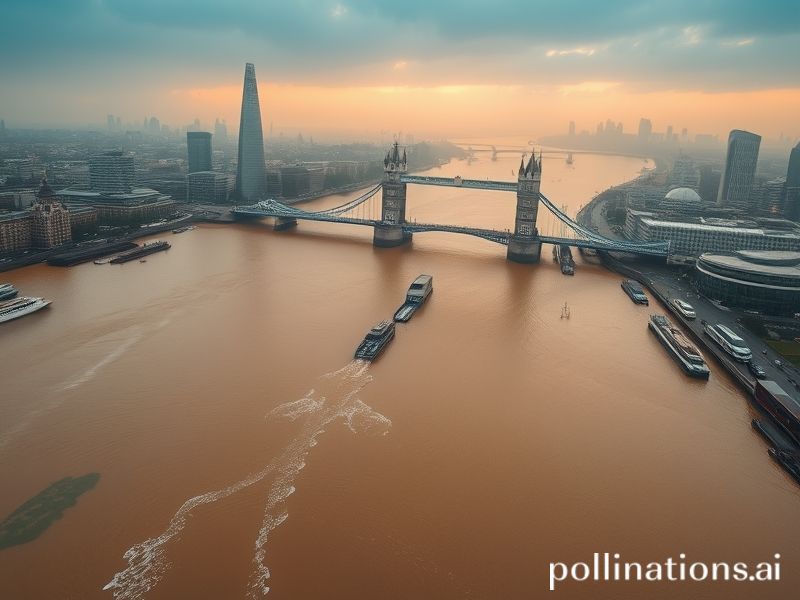Thames Water’s £14bn Swirly: How London Turned Its River into a Global Financial Toilet
London—A city that once convinced half the planet that fog was romantic and rationing was patriotic—has now managed to export a new marvel: the idea that water itself can be a speculative asset class. Thames Water, the private monopoly sloshing through 15 million British bathtubs, is circling the drain so elegantly that financiers from Sydney to Singapore are leaning in to watch the pirouette. While Californians pray for rain and Capetonians still flinch at the phrase “Day Zero,” the Thames saga is less a local plumbing mishap than a global morality play with choreography by Kafka and lighting by Bloomberg Terminal.
Let us set the scene. Thames Water’s parent company, Kemble Water, has racked up £14 billion in debt—roughly the GDP of Iceland, give or take a geothermal geyser. Investors (French, Australian, Canadian, Chinese—an Avengers-style lineup of pension funds) now discover that the utility they bought for its “stable, inflation-linked cash flows” is, in fact, a Victorian sewer wearing a ball gown made of IOUs. Cue emergency talks, Whitehall panic, and the delightful prospect of the British state renationalising something it flogged off in 1989, like a boomerang soaked in effluent.
The international rubbernecking is understandable. Across the developing world, where 2.2 billion people still lack safely managed drinking water, the spectacle of a G7 capital accidentally privatising itself into dysentery is darkly educational. “See, kids,” murmurs a World Bank consultant in Nairobi, “even rich nations can’t resist turning H₂O into CDO.” Meanwhile, Dutch engineers—who regard the concept of “river” as an engineering suggestion—watch Londoners debate hosepipe bans with the same expression medieval doctors reserved for blood-letting enthusiasts.
Globally, Thames Water is a case study in what happens when infrastructure is treated like a buy-to-let flat. Dividend recapitalisations—corporate speak for “pay yourselves today, bill the grandchildren tomorrow”—have been so aggressive that Ofwat, the regulator, now resembles a substitute teacher locked in a supply cupboard. In 2022 alone, Thames’ shareholders extracted £37 million while leaks gushed at a rate of 630 million litres daily. It’s the sort of hydraulic paradox that would impress even the Romans, who at least had the decency to invent indoor plumbing before monetising it.
The wider significance? First, the myth that private operators are automatically more efficient than public ones is dissolving faster than wet wipes in a fatberg. Second, credit markets are learning that water utilities, once considered as dull as tap water itself, can be spectacularly flammable. Moodys has already slashed Thames to junk; analysts in New York now list “English rainfall volatility” alongside Argentine peso swaps in their slide decks entitled “Stuff That Can Blow Up.” Third, climate change is turning every utility into a weather derivative. When your business model depends on drizzle in the Cotswolds, no amount of financial engineering will make clouds pay interest.
And yet, there is a perverse elegance to the choreography. The very investors who demanded “efficiency” now lobby for a government bailout—socialism for capital, capitalism for the rest of us. Ministers mutter about “temporary” public ownership, a phrase with the same shelf life as “temporary” income tax (introduced 1799, still going strong). Should renationalisation occur, the UK will have performed the rare trick of selling low, buying high, and taxing citizens for the privilege—an arbitrage even Goldman Sachs finds gauche.
In conclusion, Thames Water is not merely a soggy embarrassment on the banks of a once-majestic river; it is a harbinger. From Jakarta’s sinking aquifers to Phoenix’s disappearing Colorado share, the world is discovering that treating water as a financial asset is like treating lungs as a rental property: profitable until the tenant suffocates. The Thames may look quaint, but its stench is cosmopolitan. Investors, regulators, and parched citizens everywhere should take note. When the river finally runs dry, the only thing left floating will be the paperwork.







